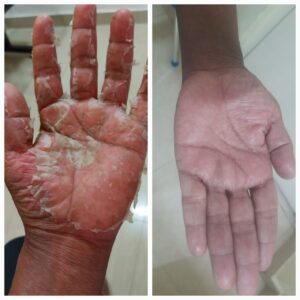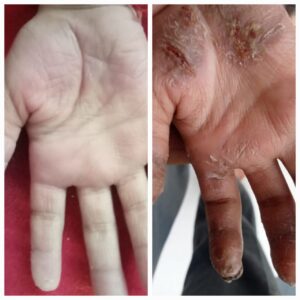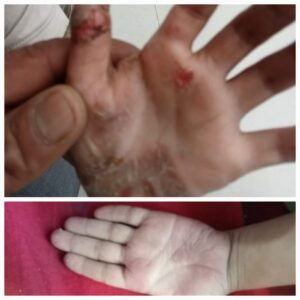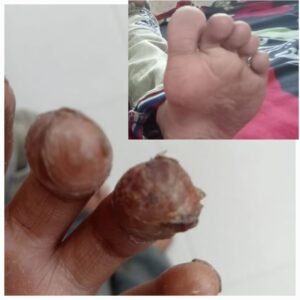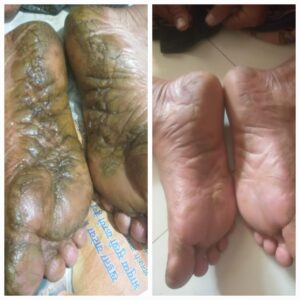Palmoplantar Psoriasis Treatment
What is Palmoplantar Psoriasis?

psoriasis is a specific type of psoriasis that primarily affects the palms of the hands and the soles of the feet. It is characterized by the development of red, scaly patches on these areas. This condition can cause discomfort, pain, and difficulty in performing daily activities that involve the use of hands and feet. Palmoplantar psoriasis can present as either palmar psoriasis, which affects the palms, or plantar psoriasis, which affects the soles of the feet.
For effective palmoplantar psoriasis treatment in Mumbai, it is advisable to seek the expertise of a dermatologist or healthcare professional who specializes in skin disorders. They will assess the severity of your condition and develop a personalized treatment plan tailored to your specific needs. Treatment options for palmoplantar psoriasis may include topical medications, phototherapy, systemic medications, and other targeted therapies. It is important to consult with a qualified specialist to ensure appropriate management and improvement of symptoms. Heal Psoraisis can provide the necessary care and expertise for palmoplantar psoriasis treatment.
Symptoms of Palmoplantar Psoriasis
Palmoplantar psoriasis can occur as part of the more general plaque psoriasis, or it may only affect the palms of the hands and the soles of the feet.
Symptoms include:
- Well-defined areas of raised, thickened skin
- Scaling
- An itching and burning sensation
- Pain
- Cracking and Bleeding
Palmoplantar psoriasis causes red, scaly patches, itching, and discomfort on the palms and soles. It can impact daily activities. For palmoplantar pustulosis natural treatment in Mumbai, consult a qualified dermatologist specializing in skin disorders. They offer personalized guidance and may provide palmoplantar psoriasis cure options. Heal Psoraisis can help you to manage palmar plantar psoriasis effectively.
Causes of Palmoplantar Psoriasis
The precise causes of palmoplantar psoriasis are not fully understood, but it is believed to be an autoimmune condition. In this form of psoriasis, the immune system mistakenly targets healthy skin cells, resulting in the rapid multiplication and buildup of cells on the palms and soles. This abnormal immune response leads to symptoms such as red, scaly patches, itching, and discomfort. Trigger factors like stress, skin injuries, infections, or specific medications can worsen the condition. To accurately diagnose and effectively manage palmoplantar psoriasis, it is essential to seek medical advice from a dermatologist. Reputable clinics offers specialized treatments for both palmar and plantar psoriasis treatment in Mumbai.
Risk of Palmoplantar Psoriasis
Palmoplantar psoriasis can occur in people of any age, gender, or ethnicity, but some factors may increase a person’s risk of developing this condition.
Here are some of the risk factors:
Family history: If a person has a family history of psoriasis, including palmoplantar psoriasis, their risk of developing the condition is higher.
Age: Palmoplantar psoriasis can occur at any age, but it is more common in people between the ages of 30 and 50.
Gender: Both men and women can develop palmoplantar psoriasis, but it is slightly more common in women.
Obesity: Being overweight or obese increases the risk of developing psoriasis, including palmoplantar psoriasis.
Smoking: Smoking has been linked to an increased risk of psoriasis, and it may also make the symptoms worse.
Stress: Emotional stress can trigger or worsen psoriasis symptoms.
Certain medications: Some medications, such as lithium, beta-blockers, and antimalarial drugs, can trigger or worsen psoriasis symptoms.
Other health conditions: People with other health conditions, such as HIV, type 2 diabetes, and autoimmune diseases, may have a higher risk of developing palmoplantar psoriasis.
Ayurvedic Treatment for Palmoplantar Psoriasis
Palmoplantar psoriasis is a chronic inflammatory skin condition that significantly affects quality of life. It causes painful, itchy, and scaly patches on the palms and soles, making everyday activities difficult. Emotional distress and decreased self-esteem can also occur. Ongoing management and palmoplantar psoriasis treatment are necessary. Consultation with an ayurvedic skin doctor is advised.
Palmoplantar psoriasis can spread to other areas of the palms, soles, or even other parts of the body. While it typically affects the palms and soles, it is not uncommon for psoriasis lesions to develop in other areas, such as the knees, elbows, scalp, or nails. The spread of palmoplantar psoriasis can vary from person to person, and it may also depend on the effectiveness of palmoplantar psoriasis treatment and individual factors. Regular monitoring and appropriate management by a healthcare professional can help minimize the spread and progression of the condition.
The exact cause of palmoplantar psoriasis is not fully understood, but it is believed to be a result of an immune system malfunction. The immune system mistakenly attacks healthy skin cells, causing rapid cell turnover and inflammation. The initial onset of palmoplantar psoriasis can vary from person to person. It may start as small, red patches that gradually grow in size and become thickened, scaly, and painful. Factors such as genetics, environmental triggers, stress, and certain lifestyle choices can influence the development and progression of palmoplantar psoriasis.
To prevent the spread of palmoplantar psoriasis, avoid scratching, maintain good hand hygiene, moisturize regularly, wear comfortable footwear, manage stress, practice good overall hygiene, and consult with a dermatologist for personalized advice and treatment options.
To manage palmoplantar psoriasis effectively, avoid scratching or picking at the affected areas, harsh soaps and detergents, tight-fitting footwear, excessive heat or cold exposure, self-medication, smoking, and excessive alcohol consumption. Consult a skin specialist for proper guidance and palmoplantar psoriasis treatment.
Healing time for palmoplantar psoriasis varies. It is a chronic condition requiring ongoing management. Proper palmoplantar psoriasis treatment, lifestyle adjustments, and working with a dermatologist can control symptoms and minimize flare-ups.
Palmoplantar psoriasis is considered a chronic condition, and while it can be effectively managed, it is generally not considered completely curable. The goal of treatment is to control symptoms, reduce inflammation, and minimize flare-ups. With the right combination of palmoplantar psoriasis treatments, lifestyle adjustments, and ongoing care, individuals with palmoplantar psoriasis can experience significant improvement in their symptoms and quality of life.
Palmoplanter Psoriasis Treatment Before & After Results
